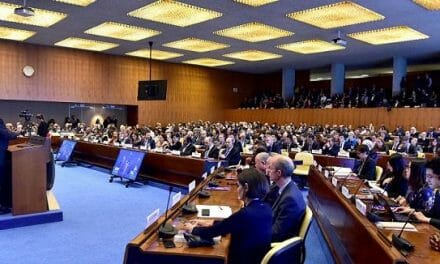
African Caucus reaffirms support for new funding initiatives

(On the Left: Mr. David Robinson, Deputy Director, African Department at International Monetary Fund (IMF); in the middle: Mr. Armando Manuel, Chair of the African Caucus and Minister of Finance of Angola)
“This obliges us to look for other sources of financing including savings that can be made from restricting illicit financial flows from Africa, especially measures that can be taken to radically reduce these mass monetary outflows and guarantee that they are used for development in the African continent,” he noted.
David Robinson, the Vice-Director of the International Monetary Fund (IMF), and one of the speakers at the African Caucus said that the fall in oil prices is a significant negative shock for the oil exporting countries which have had to make marked adjustments.
Robinson, who presented the theme ‘Africa: Regional Economic Outlooks’ pointed to the following public financial measures: budget cuts in the 2015 expenditure, above all in investments, fuel subsidies reform, taxation measures, including tax rate increases, and greater exchange rate flexibility wherever possible.
Indeed, the representative of the IMF to the African Caucus noted that the oil producing countries have to tackle issues such as the orderly implementation of spending cuts, prioritise social sectors and infrastructure and mobilise non-oil revenues. It is necessary to address low liquidity in the foreign exchange markets in countries with flexible arrangements and the absence of foreign exchange instruments in countries whose currency is indexed to the Euro.
On the closing day the emphasis fell on combating illicit financial flows to improve the mobilisation of internal resources, a topic addressed by Thabo Mbeki, the Ex-President of South Africa.
The International Monetary Fund presented the “Luanda Declaration” at the close of the African Caucus and those who took part in the meeting of the Group of African Ministers of Finance and Governors of African Central Banks, affiliated with the IMF and the World Bank, reaffirmed their support for new funding initiatives.
Joseph Tucker of the International Monetary Fund presented the “Luanda Declaration” at the close of the Caucus and spoke of the ways and means with which the Bretton Woods Institutions (BWIs) can support the challenges of financing for sustainable development, combating tax avoidance, eliminating the illicit flow of funds and strengthening Africa’s voice and representation in relation to the BWIs.
The Group stressed that a wealth of natural resources presents vast opportunities for development. On the other hand, they are aware that the countries that depend on oil for their export and tax revenues face unique challenges and remain highly vulnerable to the impact of various external disturbances.
The African Caucus proposes that the World Bank should support six regional transformative projects in the sectors of energy and agriculture, as well as a number of innovative solutions to reduce frequent funding gaps.
At the next meeting of the IMF and the World Bank scheduled for the 13 to 17 October in Lima, Peru, the Chair of the African Caucus will pass to Benin.












































